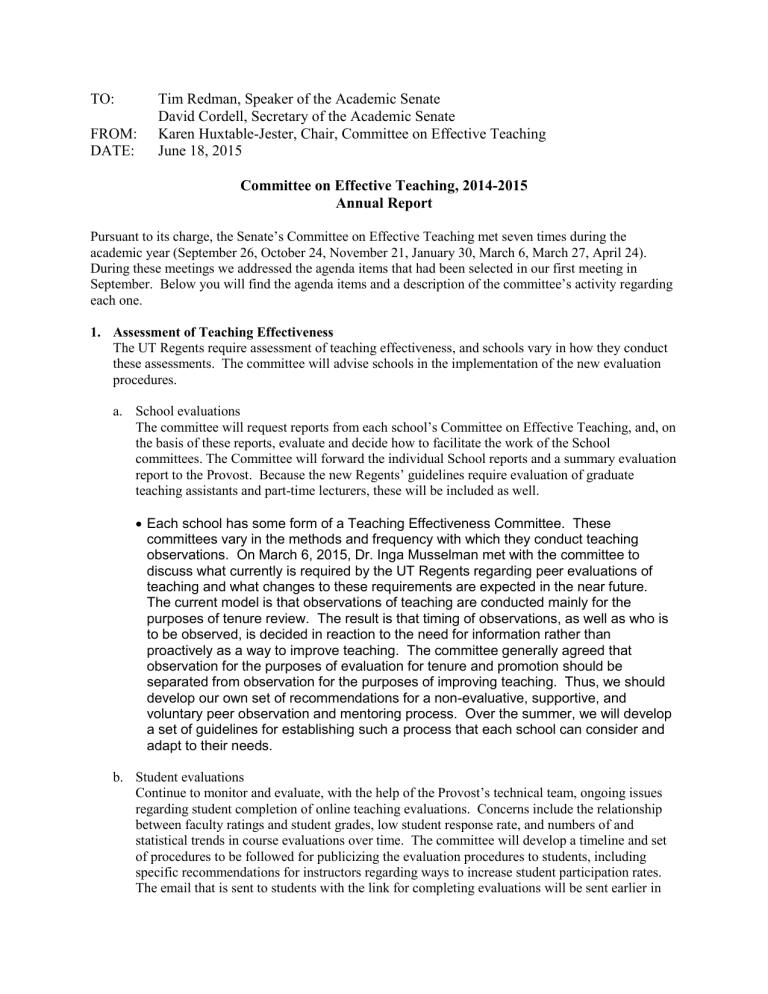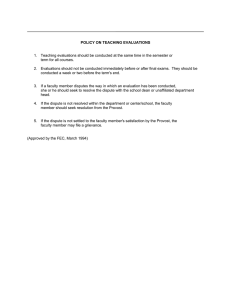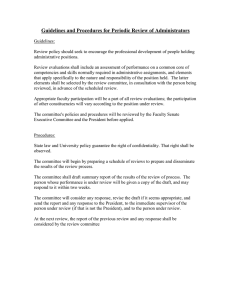TO: Tim Redman, Speaker of the Academic Senate

TO: Tim Redman, Speaker of the Academic Senate
David Cordell, Secretary of the Academic Senate
FROM: Karen Huxtable-Jester, Chair, Committee on Effective Teaching
DATE: June 18, 2015
Committee on Effective Teaching, 2014-2015
Annual Report
Pursuant to its charge, the Senate’s Committee on Effective Teaching met seven times during the academic year (September 26, October 24, November 21, January 30, March 6, March 27, April 24).
During these meetings we addressed the agenda items that had been selected in our first meeting in
September. Below you will find the agenda items and a description of the committee’s activity regarding each one.
1.
Assessment of Teaching Effectiveness
The UT Regents require assessment of teaching effectiveness, and schools vary in how they conduct these assessments. The committee will advise schools in the implementation of the new evaluation procedures. a.
School evaluations
The committee will request reports from each school’s Committee on Effective Teaching, and, on the basis of these reports, evaluate and decide how to facilitate the work of the School committees. The Committee will forward the individual School reports and a summary evaluation report to the Provost. Because the new Regents’ guidelines require evaluation of graduate teaching assistants and part-time lecturers, these will be included as well.
Each school has some form of a Teaching Effectiveness Committee. These committees vary in the methods and frequency with which they conduct teaching observations. On March 6, 2015, Dr. Inga Musselman met with the committee to discuss what currently is required by the UT Regents regarding peer evaluations of teaching and what changes to these requirements are expected in the near future.
The current model is that observations of teaching are conducted mainly for the purposes of tenure review. The result is that timing of observations, as well as who is to be observed, is decided in reaction to the need for information rather than proactively as a way to improve teaching. The committee generally agreed that observation for the purposes of evaluation for tenure and promotion should be separated from observation for the purposes of improving teaching. Thus, we should develop our own set of recommendations for a non-evaluative, supportive, and voluntary peer observation and mentoring process. Over the summer, we will develop a set of guidelines for establishing such a process that each school can consider and adapt to their needs. b.
Student evaluations
Continue to monitor and evaluate, with the help of the Provost’s technical team, ongoing issues regarding student completion of online teaching evaluations. Concerns include the relationship between faculty ratings and student grades, low student response rate, and numbers of and statistical trends in course evaluations over time. The committee will develop a timeline and set of procedures to be followed for publicizing the evaluation procedures to students, including specific recommendations for instructors regarding ways to increase student participation rates.
The email that is sent to students with the link for completing evaluations will be sent earlier in
the semester so that professors who wish to do so will be able to have students complete evaluations in class.
A key concern of committee members has been the timing of communications emailed to students regarding completion on online course evaluations. Faculty who wished to exercise the option of making time for students to complete the evaluations during a class session toward the end of the semester had trouble doing so last year because students did not receive their individual course links in time. In November the committee made a formal request to the Senate that the direct links be sent to students no later than Monday, December 1, 2014 and Monday, April 20, 2015. The request was approved and the Provost’s Technology Group did send the links before these dates.
A set of guidelines for maximizing the likelihood that students will complete evaluations and that they will give useful feedback also has been posted in the Faculty Forum in eLearning. Some faculty concerns about student evaluations of teaching have been shared and addressed on the anonymous discussion board in the Faculty Forum.
2.
Classrooms & Technology
Upgrades of classroom technology are continuing across campus. Training in the use of new technology is already available to individual faculty on request. The committee will consider any new suggestions for school-specific or new teaching methods made possible by these upgrades, as well as any needs for new equipment, software, etc.
Dr. Darren Crone, of Educational Technology Services, has been attending all of our meetings to keep us apprised of classroom updates and to stay informed of issues that his team may be able to help address. Because ETS has upgrades well in hand, no particular problems were introduced or addressed this year.
3.
Promotion of Teaching Effectiveness a.
Request funding from the Provost’s office to invite a renowned speaker to give a teaching seminar on campus.
On February 27, 2015, the committee hosted the Excellence in Teaching Lecture and
Panel Discussion, which was sponsored by the Provost. Dr. Mike Wesch joined us from Kansas State University to present “Teaching as Soul-Making: The end of wonder in the digital age.” Dr. Marion Underwood was primarily responsible for inviting the speaker, and organizing and planning the event. We had 167 responses to our request for RSVP, and in spite of the severe weather, had nearly complete turnout by faculty, doctoral students, and others. We plan to request funding to continue the lecture series every fall and spring. On April 24, at our last meeting of the year, we decided to look into inviting Dr. George Gopen to give writing workshops for faculty and graduate students in the fall. We also discussed inviting Dr. Stephen Chew of
Samford University for the second Excellence in Teaching lecture in the spring. b.
Evaluate, publicize, and maintain the eLearning Faculty Forum & Resources.
In September 2014, I sent a message to the Associate Deans of Undergraduate
Education asking them to help publicize to faculty the eLearning Faculty Forum &
Resources as a sort of virtual teaching center. Aside from Dr. Melanie Spence, I do not know whether or not any did so. In February, I made a brief presentation to the
Senate to demonstrate the eLearning Faculty Forum and explain its current configuration and potential uses. The Forum is a work in progress and depends on faculty input to grow and adapt to their needs. Use of the forum by faculty continues to be sparse, and I do not know whether or not those who have logged in have found it useful. In August, the committee will submit a request to the Office of Communication to send a direct email to all faculty informing them about the forum and soliciting their input. I have continued to add and update resources throughout the year. c.
Develop detailed recommendations regarding the establishment of a University-wide Center for
Excellence in Teaching and Learning.
On March 27, Dr. Jessica Murphy met with the committee to discuss what she has learned from her investigations of Teaching and Learning Centers at comparable universities and from attending a recent conference of the Professional and
Organization Development (POD) network in Higher Education. The value of having a center is irrefutable, not only for the obvious benefits of improving teaching across the university and improving the training of graduate students to make them more competitive in the job market, but for satisfying accreditation requirements. A center provides a physical marker of the university’s commitment to teaching. The committee approved of Dr. Murphy’s plan to present to the Provost a job description and request for hiring a director to develop a teaching and learning center. d.
In recognition of the idea that teaching occurs both inside and outside of classrooms, the committee will consider ways to promote faculty awareness of and opportunities for mentoring undergraduates.
Currently, there are no workshops or seminars on the UTD campus that faculty can sign up for on how to mentor undergraduate students for research. On April 24, we discussed creating a workshop for faculty and/or graduate students on student mentoring. On this campus, we already have faculty who are providing outstanding mentoring for students in their labs, and even have a formal award for recognizing these faculty. One possibility for a workshop is to invite award recipients to share what works. Andy Blanchard has offered to recruit Bruce Gnade to work with the committee this summer to develop a plan. e.
Recognize and promote innovative teaching techniques. Identify faculty who are using particularly effective and nontraditional techniques such as flipped classrooms or inquiry-based learning. Develop ways for these faculty members to share their experiences.
Educational Technology Services already provides some excellent presentations in this area, especially with regard to techniques that involve technology. However, more can be done. One possibility that the committee can explore in the coming year is to conduct a Qualtrics survey of faculty across schools to gather data on what teaching
strategies and methods are currently being used. The Teaching Practices Inventory developed by Carl Wieman could give us a good starting point on this.

